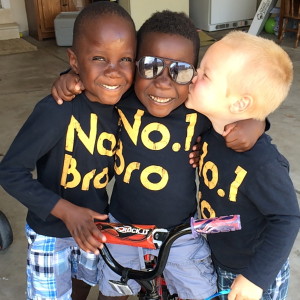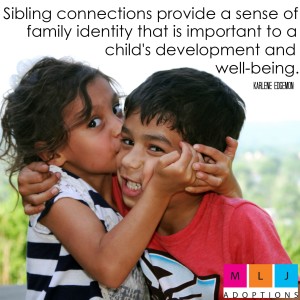
#1 Bros
International adoption can sometimes cause siblings to be separated when they are unable to be placed together. For many children, the relationship a child has with his or her sibling(s) is the longest sustained relationship they have had in their life, often beyond that with their biological parents. Therefore, being separated from this important person can be truly devastating to a child and he or she may experience fear, grief, loss, isolation, and depression. You may see your child demonstrate these feelings by crying, withdrawing from other people, having trouble sleeping or concentrating, not eating, experiencing poor school performance, having headaches or other physical complaints, becoming preoccupied with his sibling’s welfare, or being angry with you. Certainly, if you notice such behaviors continuing beyond normally expected timelines or adversely affecting your child’s functioning, you should seek professional support through a therapist or physician.
We know that sibling connections provide a sense of family identity and that they are important to the child’s development and well-being. We also know that most times, the decision to separate siblings is completely out of our control. It is usually determined by the Central Authority of the child’s country. Still, as the parent, you want to support your child, assist him or her in managing their emotions and find ways to help them connect with the siblings left behind. Some ways to help keep the siblings connected are:
- Keep a photograph of the sibling in your child’s room so it is always accessible to your child.
- Provide opportunities for your child to talk openly about his or her siblings and memories they had with them.
- If the sibling’s location is known and accessible, allow phone calls between them.
- If the children are older, help facilitate contact between them via social media options such as Skype, email, Facebook, or video chats with the other child’s parental approval, of course. You may wish to monitor this contact.
- If the children have all been adopted by other U.S. parents, perhaps it would be possible to schedule face to face visits or meet at a universal location, like a park, for a special event.
- Low tech options such as cards, letters, sending pictures, etc. are still good methods for contact and most children love to receive mail!
- Exchange holiday greetings or gifts as appropriate.
Regardless of the type of contact utilized, you will want to assure that it is in the best interests of your child by being safe, healthy and appropriate. You will want to supervise any visits or calls, especially initially, to assure their safety. You also may not want to discuss the first few visits ahead of time with your child in case the visit or call becomes cancelled for any reason and thus creates additional stress or disappointment for them. Most importantly, you will want to discuss the visit or other form of contact with your child after it occurs in a calm and supportive manner to see how he or she is feeling and how they think the interaction went. Talking with your child after he or she has had time to process it can provide you with good insight into the pros and cons of such contacts. By allowing your child the option to stay connected with his siblings, you show your child how much you love and care for him, that you understand the stress he is experiencing by living apart from his siblings, and that you are committed to preserving the ties that will enable him to grow and thrive in your home.
For more information on our international adoption programs, please contact us.

